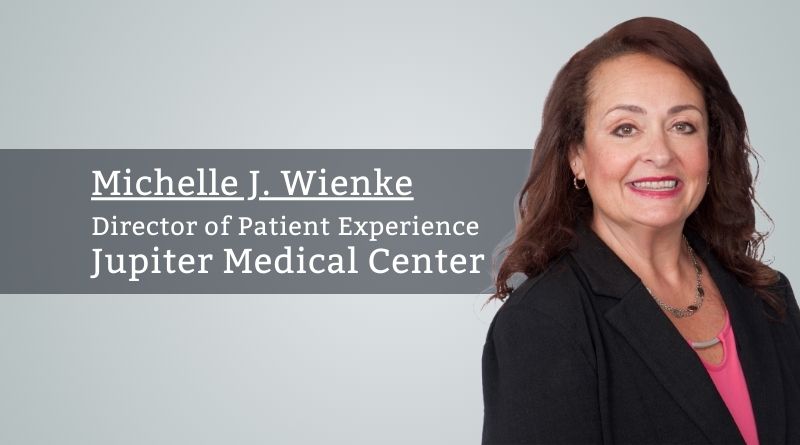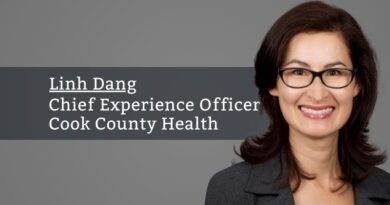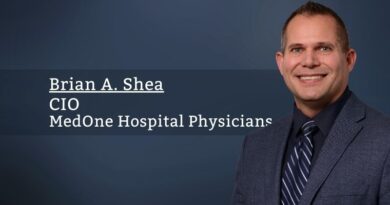Focusing on what is important, exceptional patient care and outcomes
By Michelle J. Wienke, Director of Patient Experience, Jupiter Medical Center
Healthcare has seen dramatic shifts in attitudes and behaviors including increases in incivility, behaviors and a general sense of entitlement. Proactively addressing the changing landscape of healthcare; identifying and addressing behaviors, our team has been at the cutting edge of establishing behavior standards-encompassing our campus with tools to assist in our delivery of exceptional care-not limited to our patients, families and visitors, but our teammates as well.
Many of us were raised to believe that the customer was “always right”. This led to an increase over time in discourtesy in every area of customer service, but healthcare has been particularly hard hit. People struggle with diagnoses, loss, changes in family structure, etc., and this has a profound effect on how they present themselves. There has always been an “excused” culture in healthcare, although it was not seen in the post-pandemic rates that we now have reported. Healthcare workers at core are more tolerant; accepting behaviors as “they are ill” when it wasn’t the larger aggregate of our population.
The increasing lack of respect in the post-pandemic world is much more frequent and violent and has led to the necessity of making changes to address the shifting healthcare landscape. Once the world altered in 2019 and 2020, I believe the way we address each other as humans has changed. There are many outside forces affecting this, but as we allowed these behaviors to increase, we have created a workplace that can feel perilous. We saw a sharp increase in dangerous behaviors during this time. This was not only from patients, but also from family, visitors, etc., and this created compounding stress for our teams.
Proactivity in addressing gaps in communication, setting expectations for delay of care and providing education and support are key to ensuring an extraordinary patient experience, and decreased behavior issues.
This post-pandemic period has seen the decompensation of overall mental health for many. The stress of living through a global pandemic changed the way we view life and death and behaviors began to erode. What would rarely be reported years ago has now dedicated channels on social media as “entertainment”. Politeness, decency, and respect decreased, and incivilities like yelling, throwing, acting out, etc., took their place. Over the last three years, we have developed policies to include large signage at each of our footprint doors explaining our behavior standards. Standards include no weapons, drugs, alcohol, photo or video taking at any time. It also addresses behaviors in which we have seen a sharp increase, including yelling, swearing, and physical acts such as touching or hitting. We have implemented weapons detection systems and increased our security team.
My team, once known as “Advocates,” became “Experience Coordinators”. Our role is now setting expectations for behaviors, protecting our often-mistreated teammates, and working closely with legal/risk teams to develop policies to ensure that we are advocating for all. Rounding to ensure satisfaction, supplying needed items, and collecting KUDOS & DAISY cards is now replaced by addressing the next foul phone call, letter, or next threatening behavior that must be de-escalated in real-time to ensure that the person who believes that standing with their finger in the faces of our care team is the way in which they should act.
We have done an incredible job of this over the last four years in my tenure as Director—our “likelihood to recommend” rates consistently in the high 80 to mid-90s percentile each quarter. We are the sought-out employer in the area due to our “family-like” feel. We are supported in our community by generous donors, a superb senior leadership team, and board of directors who offer guidance to ensure our not-for-profit hospital system continues to grow and meet the needs of our community. We face these challenges daily and it takes a toll, but we do see a decrease in the frequency and severity of these issues post behavior standards launch, as well as an increase in the satisfaction of our teams.
Teammates are now trained on “It’s a conversation, not a confrontation”, a simple 30-minute, six slide powerpoint that I developed that teaches our teams how to best advocate for themselves. Simple acts like empathy and identifying poor behavior are often needed to get the focus back on the patient in the bed. My team logs each incident to be investigated and follows up after. This can be as simple as a phone call or a letter outlining the violation that occurred, and in some cases, may include discharge from practices or the ability to visit our locations aside from our emergency department (ED). We ensure that patients are aware that they may still visit our ED 24/7, but they will be under watchful eye, with the team having knowledge of a previously documented incident(s). This allows our security and care team to de-escalate a patient seeking our emergency care from the moment they enter our doors. Proactivity in addressing gaps in communication, setting expectations for delay of care and providing education and support are key to ensuring an extraordinary patient experience, and decreased behavior issues.
Healthcare leadership is still a career that I am passionate about. We have gained significant traction over the last few years. The conversation is becoming easier for our teammates, as they know they are not only protecting their teammates from this egregious behavior, but themselves as well. At the end of each week, I am grateful to be in a profession that I love, supported by leaders who have the shared vision of continuing to make our hospital the choice and destination for all. Training, engaging and supporting are now my favorite part of my role. I am acutely aware that we are making a positive difference, one healthcare provider and one satisfied, well-mannered patient at a time.



